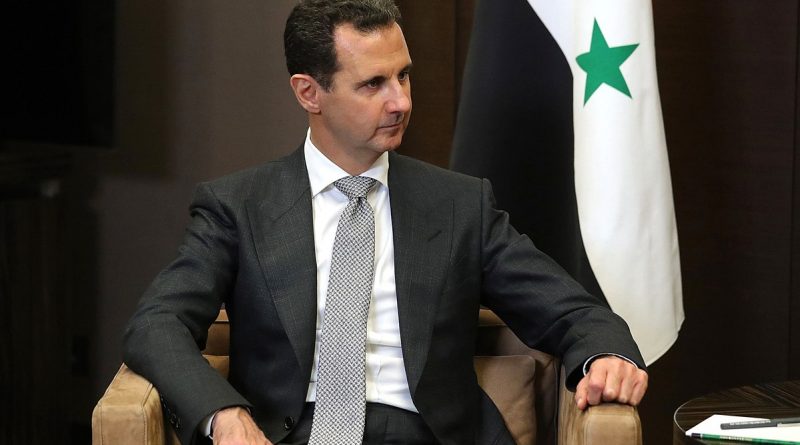FOCUS on Pariah Leaders: Bashar al-Assad
Hamzah Khan
Staff Writer
In early October, Syrian President Bashar al-Assad received a phone call from King Abdullah II of Jordan, their first since Abdullah called for Assad to step down in 2011 during the Arab Spring, according to Al Jazeera. Jordan is not alone in normalizing relations with their estranged Arab neighbor—Egypt and the UAE have both contacted the Syrian government. Jordan and the UAE have come to agreements to improve economic ties and resume trade with Syria, despite U.S. sanctions.
The United States also looked the other way as Egypt transferred fuel through Syria to Lebanon, which is embroiled in a devastating economic crisis. Although the Biden administration is against normalization with the Syrian government, Assad seems to be easing his way back into the good graces of his Arab neighbors. Until now, Syria’s main supporters have been Iran and Russia. This normalization also carries a tacit acknowledgment that the regime won the Syrian civil war that devastated the region for the last decade, according to Axios.
Assad came to power in Syria in 2000 after the death of his father, Hafez al-Assad, who ruled Syria from 1970, according to Al Jazeera. Hafez al-Assad came to power in a coup in 1970 leading the secular Ba’ath party, which promoted Arab nationalism and helped consolidate his favorability among the Sunni population. Bashar benefitted greatly from nepotism and was given full support to become the next President of Syria from Parliament and the military upon his father’s death.
Early in his rule, Assad was criticized heavily for Syria’s involvement in Lebanon, especially for his government’s alleged involvement in the assassination of Lebanon’s Prime Minister which drew condemnations from fellow Arab leaders. Assad cracked down heavily on dissent throughout his rule while allowing nepotism and corruption to run rampant. These factors culminated in the 2011 Arab Spring when uprisings throughout the Middle East spread to Syria, leading to the largest demonstrations against the Assad regime to date.
The uprisings in Syria began in March 2011 in the southern city of Daraa, led by student activists who were met with a brutal government crackdown, reports Reuters. Thousands of people were killed as protests spread throughout the country. By the end of 2011, the situation in Syria devolved into a full-blown civil war, sparking the worst humanitarian crisis since World War II, according to the UN. The international community condemned Assad and the Arab League suspended Syria’s membership in response to his atrocities.
The Syrian Civil War was truly a war with no “good guys”—one side had a repressive dictator while the other had rebel factions that began as moderate pro-democracy movements but became co-opted by violent Islamist jihadist groups. The U.S. and its allies armed and supported the Free Syrian Army (FSA), initially described as moderate rebels, along with al-Qaeda-affiliated jihadist forces such as Jabhat-al-Nusra, reports The Washington Post.
The “moderate” rebels, including the FSA, however, were found guilty of atrocities from the beginning, according to BBC News and The Guardian. These are the current forces in control of Idlib, the last rebel stronghold. Sunni jihadist groups like ISIS, Jaysh-al-Islam, Ahrar-al-Sham, and other rebel groups dominated various cities in Syria, brutalizing minorities and committing atrocities, according to Foreign Affairs. Western support for rebels weakened the government and allowed ISIS to emerge, exacerbating the refugee crisis in 2015. According to the Council of Foreign Relations, the war has resulted in nearly 400,000 dead, 5.6 million refugees, and 6.2 million people displaced internally.
Assad’s government was guilty of numerous atrocities, including allegedly using chemical weapons, reports Al Jazeera. Assad truly became a pariah in the international community after horrific chemical attacks on Ghouta in 2013 and again on Douma in 2018, reports France24. As Bashar verged of losing the war, the Russian and Iranian governments came to his aid and helped turn the tide. They were involved in indiscriminate bombing campaigns of rebel strongholds, like Aleppo and Ghouta, which killed thousands of civilians, according to NBC News. Iranian-backed militias supported Assad against ISIS as well, helping him to reassert control over most of Syria. For better or for worse, Assad has won the war, and the best many can hope for is for some semblance of peace to return to Syria.
Image Courtesy of Пресс-служба Президента России (Wikimedia Commons)


